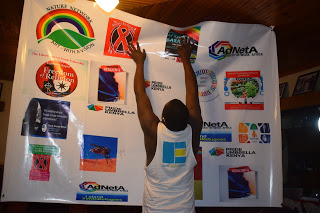COVID-19 and How It Impacts My Life: Uganda Queer Short Stories - Desert Island Series
COVID-19 and How It Impacts My Life: Uganda Queer Short Stories -
Desert Island Series
Henrietta
The Desert Island Series are about COVID-19 and daily
activities of life among the LGBTIQQ of Uganda. These are radical compositions
countering deficit narratives used to justify othering, marginalization,
externalisation and peripheralisation. This is an art of crafting, claiming and
consolidating space for Queer persons to talk about, demand and recognise how
they can promote self-determination and quality life. In the stories we
celebrate innovations, executions and translations that culminate into lived realities
and destinies.
Moderator and Interviewer: Tom Muyunga-Mukasa
Featuring: Any person willing to tell a story
Synopsis
Meet Henry, an adult male-to-female Transgender Ugandan Person, a
Clinical Psychologist and Life-span Counsellor. The father is a prince from
Buganda Kingdom, an Anglican Church member and the mother is also Anglican
heading the Mothers’ Union in Kisugu a suburb of Kampala Capital City
Authority. Henrietta as she is known is a graduate in Clinical Psychology from
Makerere University and her hands are so busy now that we are experiencing
COVID-19 pandemic. Henrietta is sharing her struggles, tribulations, triumphs
and lessons during COVID-19 restrictions.
Tom: Are you happy we are doing the Desert Island Series and
please tell us about yourself?
Henrietta: Thank you. Yes, I am happy to be here. I am Henry
Kiweewa Ssemakookiro. I am a prince (princess too). My father is one of the
uncles to the present Buganda king. We are 12 children and I am one of three
boys. It means there are 9 girls at home. I am a Clinical Psychologist and
contribute my expertise by providing counselling and guidance online, by phone
and in person at five major hospitals in Uganda. I also lecture to 1st,
2nd and 3rd Year Medical students in three
Universities. I hope to continue further
studies in Clinical Psychology and may be become a Professor.
Tom: Are you gay?
Henrietta: Hahaha! Yes!
Tom: Why are some people gay?
Henrietta: I like the
question “why are some people gay?” or “why do people possess sexual
orientation?” and not “why are you gay?” which to me is an insult to all those
who are gay. It is as if one asked a heterosexual married man or couple who are
childless, “why they do not have children!”
I am gay because I exhibit sexual desire or behaviour directed toward
a person or persons of my own sex. I mean a male person. I am instinctively
drawn to males. But that is the external story. The internal story is about
genetics and a non-genetic component. The hormones that bathed me while I was
in the womb of my mother and the environment are important factors. By the way,
there is no single “gay gene” out there at all. It is just that we possess
variations in DNA on chromosomes 7, 11, 12 and 15. These variants cannot be
responsible for an entire normativity. They cannot predict my orientation. It
is far more complex.
Tom: So why is the conversation measured by ‘normal’ and
‘abnormal’ scale?
Henrietta: This is an important point. Normal is defined in many
ways using notions based on majorities and minorities which in turn rely on:
statistics; psychology; sociology; phylogenetic; legal; and purpose in life.
Statistically: if behaviour conforms to the majority of people it
is considered ‘normal.’
Psychologically: if the behaviour brings happiness and not anxiety
then it is normal.
Sociologically: if the behaviour increases potential for more
relationships it is considered normal.
Phylogenetically: if the behaviour is found in other animal
kingdom subjects other than humans, then it is normal.
Legally: If there is no law against the behaviour then it is
normal.
Life’s Purpose: If the behaviour conforms to life’s purpose then
it is normal.
Tom: Let us talk about COVID-19. What tip are you giving to
families in their homes?
Henrietta: I echo what I read in the previous series. It is our
practices or behaviours that either expose or protect one against COVID-19
indeed.
Tom: Thank you Henrietta! How is COVID-19 affecting you or your
work in anyway?
Henrietta: COVID-19 has made my work busier. We are dealing with
more domestic abuse cases, teenage pregnancies, children traumatised because of confinement and I am concentrating on teaching long sessions via online platforms. It can be
intense and exhausting but I am enjoying it. I have found more purpose now than ever.
Tom: We are about to wind up. This being Desert Island we give you
a chance to choose an activity to do were you to find yourself in isolation but
with all the comforts one needs in life. Also give a last tip to our readers on
COVID-19 prevention.
Henrietta: You are crazy Tom!
Tom: Hahahahahahahaha!
Henrietta: If I were to be at the Desert Island, I want to come along
with my boyfriend. Oh! The last point! Wash the hands with soap for about 30
seconds; social distancing is a must; wear that mask and stay home if you must.
Tom: Thank you so much, I hope you will like us to make
more series of this with you?
Henrietta: Yes, anytime buddy, anytime..... Cheers. Send my
regards to all.




Comments
Post a Comment